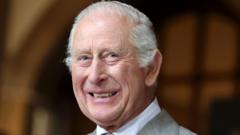In a landmark visit to Canada, King Charles III is set to make history as the first monarch to open Canada's Parliament in nearly seven decades, following recent controversial remarks from former President Donald Trump suggesting Canada should become the 51st state of the United States. This visit comes as Prime Minister Mark Carney has made it clear that Canada is "not for sale," reinforcing a sense of sovereignty that the King is expected to echo in his address.
Jeremy Kinsman, a former Canadian high commissioner to the UK, underscores the significance of the King's role in this moment, stating, "This is a big deal for the King to do this." The King's upcoming speech, delivered in both French and English, will be crafted with the advice of the Canadian government; however, it is anticipated that he will strongly affirm Canadian independence and sovereignty. "It will be very affirmative of Canadian sovereignty," predicts Kinsman, emphasizing the King's intention to celebrate Canada as an independent nation.
Since the last opening of Canada’s Parliament by a monarch was conducted by Queen Elizabeth II in 1957, many are eager to hear the King's personal reflections in his speech. Analysts expect him to incorporate his own thoughts into a government-approved text, potentially beginning with remarks that reflect his appreciation for Canada.
The more casual nature of this address stands in contrast to the traditional pomp of the UK Parliament sessions, with King Charles dressed in a suit rather than state attire. The speech, estimated at about 25 minutes, will address legislative plans and may also touch upon the critical role of First Nations communities in Canada.
As the King walks a diplomatic tightrope, he aims to maintain friendly relations with the U.S. while standing alongside Canadians in their concerns about Trump's previous statements. Sources close to the monarchy indicate that he is highly regarded globally, suggesting he will deliver a carefully measured message of support that resonates with Canadians, particularly after the contentious climate surrounding U.S.-Canadian relations.
Some critics, like Peter Donolo from the Canadian International Council, argue that using the monarchy to mediate these tensions is futile, claiming it won’t influence Trump's perception of Canada. Meanwhile, political science expert Elizabeth McCallion observes a growing awareness in Canada about the importance of this moment for national identity, eliciting mixed emotions regarding their historical ties with the British monarchy amidst current geopolitical dynamics.
In essence, King Charles III's visit and speech may not only symbolize a reaffirmation of Canadian pride but could also serve as a moment of reflection for both nations as they navigate the implications of leadership and historical alliances. Canada eagerly awaits the King's message—a pivotal expression of unity and independence in an ever-changing political landscape.
Jeremy Kinsman, a former Canadian high commissioner to the UK, underscores the significance of the King's role in this moment, stating, "This is a big deal for the King to do this." The King's upcoming speech, delivered in both French and English, will be crafted with the advice of the Canadian government; however, it is anticipated that he will strongly affirm Canadian independence and sovereignty. "It will be very affirmative of Canadian sovereignty," predicts Kinsman, emphasizing the King's intention to celebrate Canada as an independent nation.
Since the last opening of Canada’s Parliament by a monarch was conducted by Queen Elizabeth II in 1957, many are eager to hear the King's personal reflections in his speech. Analysts expect him to incorporate his own thoughts into a government-approved text, potentially beginning with remarks that reflect his appreciation for Canada.
The more casual nature of this address stands in contrast to the traditional pomp of the UK Parliament sessions, with King Charles dressed in a suit rather than state attire. The speech, estimated at about 25 minutes, will address legislative plans and may also touch upon the critical role of First Nations communities in Canada.
As the King walks a diplomatic tightrope, he aims to maintain friendly relations with the U.S. while standing alongside Canadians in their concerns about Trump's previous statements. Sources close to the monarchy indicate that he is highly regarded globally, suggesting he will deliver a carefully measured message of support that resonates with Canadians, particularly after the contentious climate surrounding U.S.-Canadian relations.
Some critics, like Peter Donolo from the Canadian International Council, argue that using the monarchy to mediate these tensions is futile, claiming it won’t influence Trump's perception of Canada. Meanwhile, political science expert Elizabeth McCallion observes a growing awareness in Canada about the importance of this moment for national identity, eliciting mixed emotions regarding their historical ties with the British monarchy amidst current geopolitical dynamics.
In essence, King Charles III's visit and speech may not only symbolize a reaffirmation of Canadian pride but could also serve as a moment of reflection for both nations as they navigate the implications of leadership and historical alliances. Canada eagerly awaits the King's message—a pivotal expression of unity and independence in an ever-changing political landscape.





















